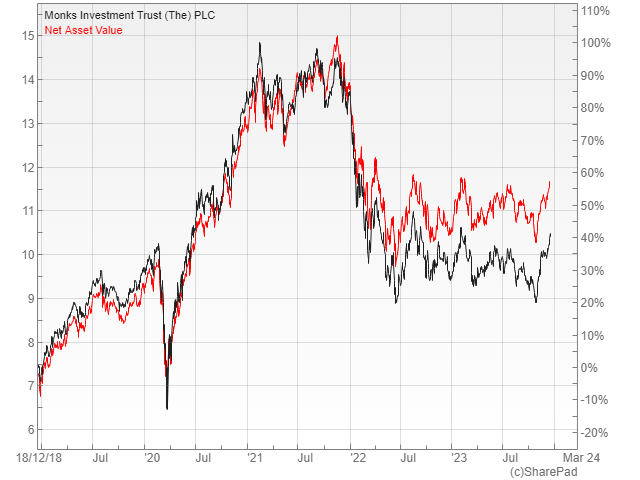Monks: Praying For A Change Of Fortune

It has been a tough couple of years for growth investors with the substantial increase in interest rates undermining the valuations of these ‘long duration’ stocks. One of the biggest casualties has been Baillie Gifford, whose market-leading trusts have seen their share prices come crashing back to earth.
A prime example is the £2.7bn Monks (LON: MNKS) that has recently released its interim accounts to the end of October. It offers a diversified and lower risk way to gain exposure to the firm’s best global ideas, yet in the past two years it has given back all the relative gains since the Global Alpha team took responsibility in March 2015.
In recent weeks there has been a growing sense of optimism that interest rates have peaked and this has resulted in a nice bounce in the shares. The underlying fundamentals are also looking more promising.
Disappointing Performance
In the six months to the end of October, the trust reported NAV and shareholder total returns of -3.3% and -7.3% respectively, which were both well behind the 2.1% gain by the FTSE World index. The Chairman said that apart from the seven US mega-cap stocks that have benefited from the surge of interest in AI, growth remained out of favour.
Some of Baillie Gifford’s trusts such as Scottish Mortgage (LON: SMT) have a high weighting to private companies, but that is not the case with Monks. The manager prefers a more modest allocation of 4.2%, yet he remains enthusiastic about the potential for the likes of the Schiehallion fund and the handful of direct holdings such as SpaceX and Bytedance.
It is interesting to note that the recent poor performance has left the trust trailing its FTSE World benchmark over the last one, three, five and ten years. Over the past decade its NAV has lagged the index by about 35%.
Improving Fundamentals
Baillie Gifford expect the portfolio to deliver significantly higher earnings growth than the market as a whole. Over the next three years they forecast annualised growth of 12.8%, compared to 5.5% for the benchmark, which would be the highest relative level in a decade.
Despite this, the valuation multiples are much lower than in the recent past. The portfolio forward PE ratio is currently 17.5x, a premium of 18% to the broader market, whereas towards the end of 2020 it was 27.9x with a premium of 52%.
Another positive feature is that the holdings typically have higher gross and net margins than the index and lower levels of debt to equity. This is partly due to a material rebalancing of the portfolio that was prompted by the sell-off.
More Balanced Portfolio
The managers believe that the best protection against periodic market turbulence is a three-pronged approach to growth, which involves investing in stalwart, cyclical and rapid growth companies. They admit that they were too concentrated in the latter when interest rates began to rise.
Since then, they have sold holdings that were poorly positioned in the new macro environment and where the operational progress had been underwhelming. This has enabled them to restore balance across the three groups.
Another improvement is the strengthening of the analytical inputs to the investment process, particularly those related to valuations and stock correlations. Hopefully this should mean that the portfolio is less vulnerable going forwards.
Outlook
The poor performance has seen the shares slip to an 11% discount to NAV, but unlike many trusts the Board has actively tried to address the problem. Since the start of last year the company has spent about £300m on buying back around 12.1% of its issued share capital.
Investec regard Monks as a core strategic holding for anyone looking for a well-managed, lower-risk exposure to Baillie Gifford’s best global ideas. The broker says that the differentiated philosophy, strong corporate governance and strong balance sheet, provide a good base for when the winds change and reaffirm their Buy recommendation.
It certainly looks as through interest rates have peaked, although it is possible that markets may have gotten ahead of themselves in terms of the number of cuts they are pricing in next year. If that is the case then the main risk could be the impact of a possible recession on the growth outlook for the underlying stocks.

Dumped Monks when they bought Peloton at the end of Covid, just when everyone was abandoning their indoor trainers and jumping back onto their real bikes, they then stood by and watch it burn to a fraction of what Monks paid for it. Even an imbecile could see this was a rookie move.